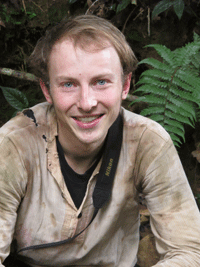.png)
EMAIL: Gaet4b@umsl.edu, admin@primates-peru.org
2011-present: PhD Candidate in Ecology, Evolution and Systematics - Department of Biology, University of Missouri - St. Louis
2002-2006: B.A. in Sociology, Grinnell College, Grinnell, IA
I joined the doctoral program in Ecology, Evolution and Systematics (EES) at the University of Missouri - St. Louis in 2011. My dissertation research is on parasite - host relationships of wild primate populations in southeastern Peru. By studying natural patterns of primate parasitism I hope to shed light on several questions related to within-host parasite relationships, inter-individual and inter-group distributions of parasites (particularly as they pertain to modes of parasite transmission), parasite-host specificity, and how parasitism relates to factors such as age, sex, reproductive status, group size, etc. In one sentence, I strive to better our understanding of the dynamic interplay of hormones, the immune system, primate behavior, and disease. The close proximity and relationships shared between wild non-human primates and humans in the Neotropics underscores the importance of studying natural parasite dynamics, which can ultimately help anticipate emerging infectious disease threats for all parties concerned.
The primate species that I work with the most include three species of Callitrichids, the saddleback tamarin (Saguinus fuscicollis), emperor tamarin (S. imperator), and Goeldi's monkey (Callimico goeldii), found in sympatry where the borders of Brazil, Peru, and Bolivia come together. There are eight other primate hosts at my field site (nine if you include the transient human researchers) that I am incorporating into my study in 2014.
Another goal of my ongoing field work in southeast Peru is more effective conservation of natural Amazon rainforest habitat and biodiversity in the Madre de Dios Department, which suffers heavy loss and disturbance related to logging and precious metal mining industries, agricultural land-use conversions, and unsustainable subsistence hunting. Excessive ecotourism is also problematic, particularly when private land owners partition and block natural wildlife corridors. I concentrate my efforts on in-country capacity building, providing conservation education, field training, and research opportunities to local Peruvians.
I am thrilled to conduct this research as a member of the Parker Lab at UMSL, and encourage anyone to contact me with questions regarding the program, the lab group, or my area of research. For more information regarding my work in Peru, or for undergraduate and graduate students interested in either a) taking an excellent training course in tropical field biology, and/or b) assisting with a field program in primate biology, visit PrimatesPeru.org. I also invite researchers to get in touch regarding potential collaborations if any of their interests align with those described on this page or on the PrimatesPeru website.

.jpg)
.jpg)